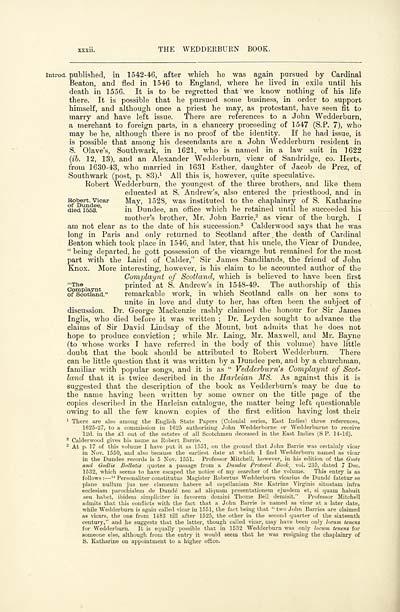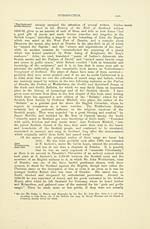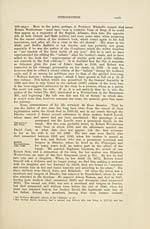Wedderburn book > History
(40) Page xxxii
Download files
Complete book:
Individual page:
Thumbnail gallery: Grid view | List view

xxxii. THE WEDDERBURN BOOK.
introd. published, in 1542-46, after which he was again pursued by Cardinal
Beaton, and fled in 1546 to England, where he lived in exile until his
death in 1556. It is to be regretted that we know nothing of his life
there. It is possible that he pursued some business, in order to support
himself, and although once a priest he may, as protestant, have seen fit to
marry and have left issue. There are references to a John Wedderburn,
a merchant to foreign parts, in a chancery proceeding of 1547 (S.P. 7), who
may be he, although there is no proof of the identity. If he had issue, it
is possible that among his descendants are a John Wedderburn resident in
S. Olave's, Southward, in 1621, who is named in a law suit in 1622
(ib. 12, 13), and an Alexander Wedderburn, vicar of Sandridge, co. Herts,
from 1630-43, who married in 1631 Esther, daughter of Jacob de Prez, of
Southwark (post, p. 83). 1 All this is, however, quite speculative.
Robert Wedderburn, the youngest of the three brothers, and like them
educated at S. Andrew's, also entered the priesthood, and in
Robert, vicar May, 152S, was instituted to the chaplainry of S. Katharine
died 1553. ' in Dundee, an office which he retained until he succeeded his
mother's brother, Mr. John Barrie, 2 as vicar of the burgh. I
am not clear as to the date of his succession. 3 Calderwood says that he was
long in Paris and only returned to Scotland after , the death of Cardinal
Beaton which took place in 1546, and later, that his uncle, the Vicar of Dundee,
" being departed, he gott possession of the vicarage but remained for the most
part with the Laird of Calder," Sir James Sandilands, the friend of John
Knox. More interesting, however, is his claim to be accounted author of the
Complaynt of Scotland, which is believed to have been first
"The printed at S. Andrew's in 1548-49. The authorship of this
of Scotland," remarkable work, in which Scotland calls on her sons to
unite in love and duty to her, has often been the subject of
discussion. Dr. George Mackenzie rashly claimed the honour for Sir James
Inglis, who died before it was written ; Dr. Leyden sought to advance the
claims of Sir David Lindsay of the Mount, but admits that he does not
hope to produce conviction ; while Mr. Laing, Mr. Maxwell, and Mr. Bayne
(to whose works I have referred in the body of this volume) have little
doubt that the book should be attributed to Robert Wedderburn. There
can be little question that it was written by a Dundee pen, and by a churchman,
familiar with popular songs, and it is as " Vedderbum's Complaynt of Scot-
land that it is twice described in the Harleian MS. As against this it is
suggested that the description of the book as Vedderbum's may be due to
the name having been written by some owner on the title page of the
copies described in the Harleian catalogue, the matter being left questionable
owing to all the few known copies of the first edition having lost their
1 There are also among the English State Papers (Colonial series, East Indies) three references,
1625-27, to a commission in 1625 authorizing John Wedderborne or Wedderburne to receive
llid. in the £1 out of the estates of all Scotchmen deceased in the East Indies (S P. 14-16).
- Calderwood gives his name as Robert Barrie.
3 At p. 17 of this volume I have put it as 1551, on the ground that John Barrie was certainly vicar
in Nov. 1550, and also because the earliest date at which I find Wedderburn named as vicar
in the Dundee records is 5 Nov. 1551. Professor Mitchell, however, in his edition of the Gude
and Godlie Ballatis quotes a passage from a Dundee Protocol Book, vol. 235, dated 7 Dec.
1532, which seems to have escaped the notice of my searcher of the volume. This entry is as
follows: — " Personaliter constitutus Magister Robertus Wedderburn vicarius de DuQde fatetur se
plane nullum jus nee clameum habere ad capellaniam Ste Katrine Virginis situatam infra
ecclesiam parochialem de Dunde" nee ad aliquam presentationem ejusdem et, si quam habuit
seu habet, ibidem simpliciter in favorem domini Thome Bell demisit." Professor Mitchell
admits that this conflicts with the fact that a John Barrie is named as vicar at a later date,
while Wedderburn is again called vicar in 1551, the fact being that " two John Barries are claimed
as vicars, the one from 1483 till after 1525, the other in the second quarter of the sixteenth
century," and he suggests that the latter, though called vicar, may have been only locum tenens
for Wedderburn. It is equally possible that in 1532 Wedderburn was ouly locum tenens for
someone else, although from the entry it would seem that he was resigning the chaplainry of
S. Katharine on appointment to a higher office.
introd. published, in 1542-46, after which he was again pursued by Cardinal
Beaton, and fled in 1546 to England, where he lived in exile until his
death in 1556. It is to be regretted that we know nothing of his life
there. It is possible that he pursued some business, in order to support
himself, and although once a priest he may, as protestant, have seen fit to
marry and have left issue. There are references to a John Wedderburn,
a merchant to foreign parts, in a chancery proceeding of 1547 (S.P. 7), who
may be he, although there is no proof of the identity. If he had issue, it
is possible that among his descendants are a John Wedderburn resident in
S. Olave's, Southward, in 1621, who is named in a law suit in 1622
(ib. 12, 13), and an Alexander Wedderburn, vicar of Sandridge, co. Herts,
from 1630-43, who married in 1631 Esther, daughter of Jacob de Prez, of
Southwark (post, p. 83). 1 All this is, however, quite speculative.
Robert Wedderburn, the youngest of the three brothers, and like them
educated at S. Andrew's, also entered the priesthood, and in
Robert, vicar May, 152S, was instituted to the chaplainry of S. Katharine
died 1553. ' in Dundee, an office which he retained until he succeeded his
mother's brother, Mr. John Barrie, 2 as vicar of the burgh. I
am not clear as to the date of his succession. 3 Calderwood says that he was
long in Paris and only returned to Scotland after , the death of Cardinal
Beaton which took place in 1546, and later, that his uncle, the Vicar of Dundee,
" being departed, he gott possession of the vicarage but remained for the most
part with the Laird of Calder," Sir James Sandilands, the friend of John
Knox. More interesting, however, is his claim to be accounted author of the
Complaynt of Scotland, which is believed to have been first
"The printed at S. Andrew's in 1548-49. The authorship of this
of Scotland," remarkable work, in which Scotland calls on her sons to
unite in love and duty to her, has often been the subject of
discussion. Dr. George Mackenzie rashly claimed the honour for Sir James
Inglis, who died before it was written ; Dr. Leyden sought to advance the
claims of Sir David Lindsay of the Mount, but admits that he does not
hope to produce conviction ; while Mr. Laing, Mr. Maxwell, and Mr. Bayne
(to whose works I have referred in the body of this volume) have little
doubt that the book should be attributed to Robert Wedderburn. There
can be little question that it was written by a Dundee pen, and by a churchman,
familiar with popular songs, and it is as " Vedderbum's Complaynt of Scot-
land that it is twice described in the Harleian MS. As against this it is
suggested that the description of the book as Vedderbum's may be due to
the name having been written by some owner on the title page of the
copies described in the Harleian catalogue, the matter being left questionable
owing to all the few known copies of the first edition having lost their
1 There are also among the English State Papers (Colonial series, East Indies) three references,
1625-27, to a commission in 1625 authorizing John Wedderborne or Wedderburne to receive
llid. in the £1 out of the estates of all Scotchmen deceased in the East Indies (S P. 14-16).
- Calderwood gives his name as Robert Barrie.
3 At p. 17 of this volume I have put it as 1551, on the ground that John Barrie was certainly vicar
in Nov. 1550, and also because the earliest date at which I find Wedderburn named as vicar
in the Dundee records is 5 Nov. 1551. Professor Mitchell, however, in his edition of the Gude
and Godlie Ballatis quotes a passage from a Dundee Protocol Book, vol. 235, dated 7 Dec.
1532, which seems to have escaped the notice of my searcher of the volume. This entry is as
follows: — " Personaliter constitutus Magister Robertus Wedderburn vicarius de DuQde fatetur se
plane nullum jus nee clameum habere ad capellaniam Ste Katrine Virginis situatam infra
ecclesiam parochialem de Dunde" nee ad aliquam presentationem ejusdem et, si quam habuit
seu habet, ibidem simpliciter in favorem domini Thome Bell demisit." Professor Mitchell
admits that this conflicts with the fact that a John Barrie is named as vicar at a later date,
while Wedderburn is again called vicar in 1551, the fact being that " two John Barries are claimed
as vicars, the one from 1483 till after 1525, the other in the second quarter of the sixteenth
century," and he suggests that the latter, though called vicar, may have been only locum tenens
for Wedderburn. It is equally possible that in 1532 Wedderburn was ouly locum tenens for
someone else, although from the entry it would seem that he was resigning the chaplainry of
S. Katharine on appointment to a higher office.
Set display mode to:
![]() Universal Viewer |
Universal Viewer | ![]() Mirador |
Large image | Transcription
Mirador |
Large image | Transcription
Images and transcriptions on this page, including medium image downloads, may be used under the Creative Commons Attribution 4.0 International Licence unless otherwise stated. ![]()
| Histories of Scottish families > Wedderburn book > History > (40) Page xxxii |
|---|
| Permanent URL | https://digital.nls.uk/95651199 |
|---|
| Attribution and copyright: |
|
|---|---|
| Description | A selection of almost 400 printed items relating to the history of Scottish families, mostly dating from the 19th and early 20th centuries. Includes memoirs, genealogies and clan histories, with a few produced by emigrant families. The earliest family history goes back to AD 916. |
|---|

